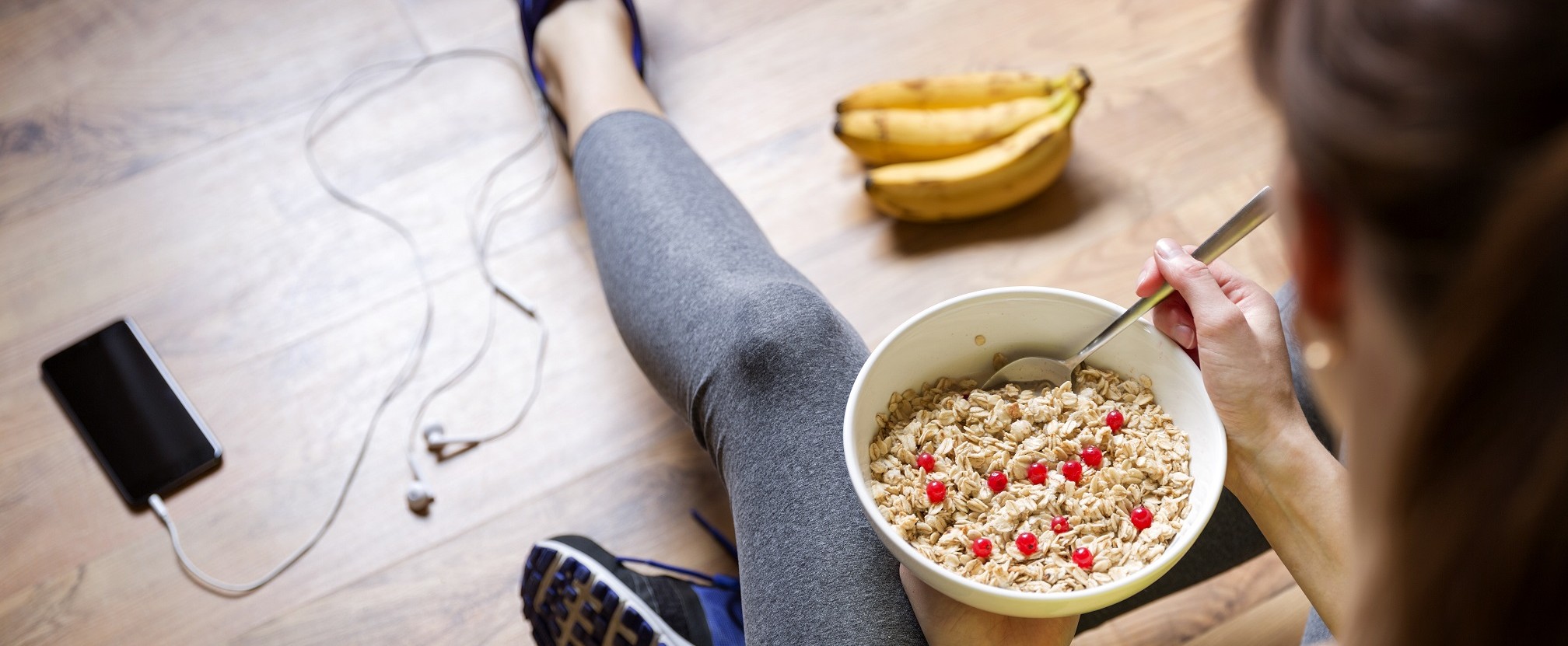Your body is an engine and, just like any mode of transport, it needs to be fuelled properly to keep it going.
When it comes to eating right there’s so much information out there, it can be hard to separate the healthy facts from the rest of it – clean eating, vegan, macro, keto, paleo…
But the most important question is – what should we be eating to fuel our exercise and is it any different from what we need to eat day to day?
Starting blocks
The Government recommends that the average woman in the UK doesn’t have more than 2,000 calories a day and an average man around 2,500. Sedentary people need less, very active people need more. Teenagers need a slightly higher intake to support their development and children need quite a bit less, as they’re smaller – check out the NHS Choices website for more information.
The food you eat should follow the Eat Well guidelines – this is the same if you exercise or not – it’s just the number of calories you need to consume that changes.
To keep our bodies in good condition and at a healthy weight, choose low-fat, low-sugar foods. A healthy diet includes a variety of wholegrain starches, some lean protein, dairy/dairy alternatives, and lots of different coloured fruits and vegetables. Foods like ice cream, sweets, crisps, biscuits, chocolate and takeaways should only be eaten in small amounts, every now and then.
Eating for weight loss
When we exercise we use more energy – this is why exercising can help with dieting. If losing weight through exercise is your goal you still need to eat properly, or you won’t have the fuel to perform well, protect you from injury or recover quickly.
Many health apps can help you work out your current BMI, a safe weight loss goal and how many calories you’ll need to reduce your current intake by a day to reach that weight. If you haven’t dieted or exercised before, it’s best to do this with a qualified personal trainer with nutrition experience, or in some cases to seek initial advice from a health professional.
If you’re trying to lose weight, using a meal tracking app is a good way to ensure you’re not over-eating.
Eating for exercise
Ideally, two to three hours before you exercise, eat some healthy carbs, such as whole-grain cereals, brown rice, and fruit and veg. Avoid foods high in saturated fats and protein, as they take longer to digest.
If you only have 5-10 minutes before you exercise, have a piece of fruit, so you don’t feel sluggish. And remember – you need to hydrate with water before, during and after exercise.
If you’re exercising for less than an hour, you won’t need to refuel during your workout, however for anything longer you’ll need 50-100 carbohydrate calories every half hour to avoid flagging – low-fat yoghurt, raisins or bananas are a good source (and there are plenty of workout options available that are easier to consume and gentler on the stomach during exercise).
Post-exercise your carbohydrate stores will be lower, especially if you’ve done a vigorous class or a long run. To help with recovery, eat a meal which includes wholegrain starches, (like brown rice) and high-quality, low-fat protein like chicken breast or tofu, ideally within 30-60 minutes of exercising.
Eating for success
If you’re looking to enhance your sporting performance, then following the Eat Well guidelines still stands. Depending on your performance goals you’ll need to work out how many calories you need and the levels of protein/carbohydrates required – this might be more calories than recommended for the average man or woman if you’re doing high levels of activity.
It’s best to work with a sports nutritionist and your coach to ensure you’re getting all the vitamins and minerals your body needs to stay healthy.
Children’s nutrition and exercise
A healthy, balanced diet is vital for a child’s development and to help fuel an active lifestyle (children need to do an hour of moderate activity a day). Like a healthy adult’s diet, your child’s nutrition should follow the Eat Well guidelines with restricted salt, sugar and fats.
Unless your child is overweight or obese, you shouldn’t put them on a reduced calorie diet. If your child does need to lose weight, this should always be done with the support of your GP, to ensure they’re getting the right nutrients so development isn’t stunted.
Children who play a lot of sport or who compete at a semi-professional/professional level might need to eat a modified diet with an additional calorie intake – it is best to discuss this with their sports coach.
Time to fuel
Making time to eat properly can be a challenge when we have such busy lives; especially if you have fussy family members or those who eat at different times.
Making a weekly menu can help you plan what you’re going to cook and eat that week. Batch cooking at the weekend and freezing in one-person portions gives you access to healthy ready meals on the go (perfect if you all eat different things at different times).
Or try meal prepping – using a couple of lean protein sources, wholegrain carbs and veggies to create meals for the next few days; different spices, sauces and combinations makes sure it doesn’t get boring. (There are even meal prep companies that can do this for you!).
Whether you want to get your family healthier through diet and exercise, gain muscle from your workout, excel in a chosen sport or lose weight – what we put in our bodies is as important as how much we move them.

